We may not have the course you’re looking for. If you enquire or give us a call on +971 8000311193 and speak to our training experts, we may still be able to help with your training requirements.
We ensure quality, budget-alignment, and timely delivery by our expert instructors.
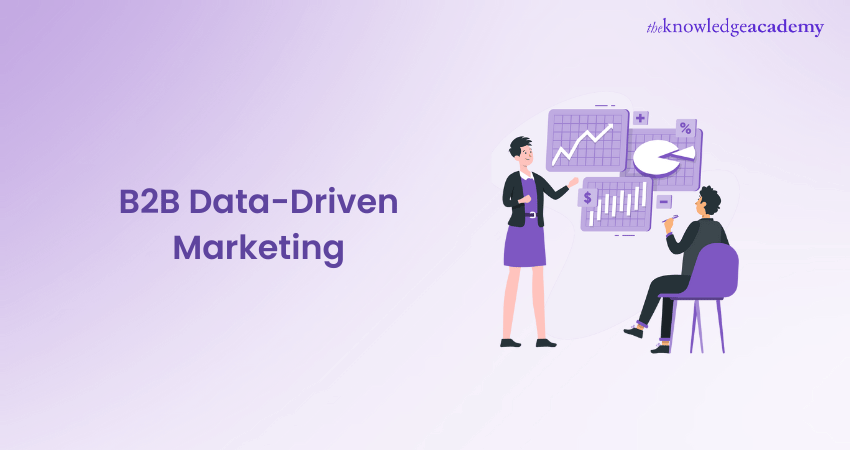
How can businesses make sure their marketing strategies truly work in today’s competitive world? B2B Data-Driven Marketing gives companies the power to understand their client’s needs and preferences with incredible accuracy, leading to more effective strategies. It’s not just a goal - it’s a game-changer for modern marketing.
So, what exactly is B2B Data-Driven Marketing, and why does it matter so much? In this blog, we’ll dive into what makes it so powerful and how it can help your business grow. Let’s explore how data can make marketing smarter, simpler, and more successful!
Table of Contents
1) What is B2B Data-Driven Marketing?
2) Essential Elements of B2B Data-Driven Marketing
3) How to Use B2B Data-Driven Marketing?
4) Steps for Implementing B2B Data-Driven Marketing
5) Examples of B2B Data-Driven Marketing
6) Benefits and Challenges of Data-Driven Marketing
7) Conclusion
What is B2B Data-Driven Marketing?
B2B Data-Driven Marketing leverages analytics and insights from various data sources to optimise marketing strategies and enhance decision-making. By analysing customer behaviour, preferences, and demographics, businesses can tailor their messaging and campaigns, leading to improved targeting and engagement, while also understanding the difference between Brand and Performance Marketing.
This approach enables better allocation of resources, increased Return on Investment (ROI), and the ability to track and measure success effectively. Ultimately, data-driven B2B Marketing enables B2B (Business-to-Business) companies to make informed decisions that align with their customers' needs and market trends.
Essential Elements of B2B Data-Driven Marketing
The following are the essential elements of B2B Data-Driven Marketing that form the foundation for successful strategies:
1) Collecting Data
Data-Driven marketing requires collecting insights from customer interactions, website analytics, social media, CRM (Customer Relationship Management) systems, and third-party sources to build a comprehensive audience understanding.
2) Analysing Data
After gathering data, marketers employ powerful analytical tools to extract meaningful patterns, trends, and insights. By dissecting this information, they gain a deeper understanding of customer preferences and behaviours, empowering them to make strategic, data-informed marketing decisions.
3) Integrating Data
Integrating data combines different sources to create a unified customer view. This ensures all relevant data points are considered, offering a holistic understanding of the customer journey. Use DMPs (Data Management Platforms) or CDPs (Customer Data Platforms) for integration.
4) Generating Actionable Insights
Generating actionable insights from data analysis helps marketers identify improvement opportunities, optimise strategies, and tailor campaigns to audience needs. These insights come from data patterns and trends indicating growth areas.
5) Ongoing Optimisation
Ongoing optimisation in data-driven marketing involves continuously reviewing and adjusting strategies based on new data and insights. This iterative process ensures marketing efforts stay effective and aligned with business goals.
Elevate your brand with advanced digital marketing tools with our Digital Marketing Tools Training – join now!
Steps for Implementing B2B Data-Driven Marketing
Implementing a successful B2B Data-Driven Marketing strategy requires a structured approach and well-defined steps. Here are the essential steps to guide you:
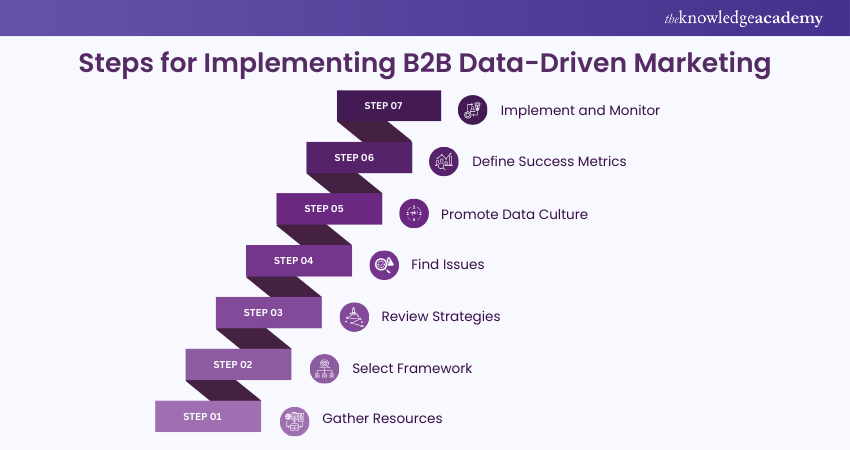
1) Gather Resources
Collect the right tools and talent. This means:
a) Investing in data collection software
b) Acquiring analytical tools
c) Building a team with data analysis skills
2) Select Framework
Select a clear framework that guides your data strategy. This could be:
a) Mapping the customer journey
b) Using predictive analytics
c) Tracking specific marketing models
3) Review Strategies
Take a hard look at your existing marketing approaches. Identify where data can:
a) Improve targeting
b) Enhance personalisation
c) Increase campaign effectiveness
4) Find Issues
Proactively identify challenges such as:
a) Poor data quality
b) Disconnected data sources
c) Limited analytical capabilities
5) Promote Data Culture
Transform how your team thinks about data:
a) Encourage data-based decision-making
b) Provide training in data interpretation
c) Make data insights accessible to everyone
6) Define Success Metrics
Create clear, measurable goals that:
a) Align with business objectives
b) Track marketing performance
c) Help you understand your progress
7) Implement and Monitor
Put your data-driven strategies into action. This means:
a) Deploying carefully crafted marketing campaigns
b) Constantly tracking campaign performance
c) Collecting fresh data and insights
d) Regularly refining your approach
Elevate your Ecommerce success by mastering product content creation with our expert-led Product Content For E-Commerce Training today!
Examples of B2B Data-Driven Marketing
Let’s move beyond theory and explore some compelling examples of successful data-driven marketing in the B2B world.
1) HubSpot
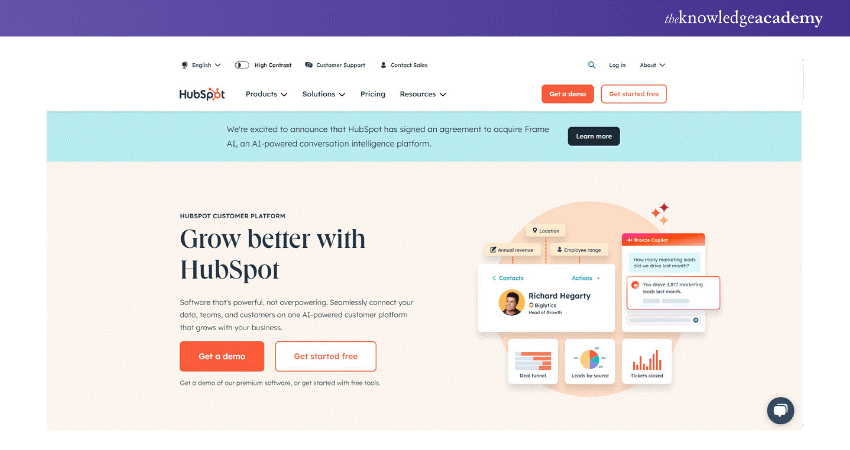
A leading B2B SaaS provider uses Data-Driven marketing to enhance customer trust and loyalty. Their tools offer a comprehensive customer journey view and deliver actionable insights for optimisation. They leverage data to create impactful resources, addressing audience-specific challenges.
Even their landing pages are data-informed, ensuring relevance and effectiveness. By aligning content with audience needs, they demonstrate how data fuels personalised, engaging, and successful B2B Integrated Marketing strategies, which are crucial components of effective B2B Business Development Strategies.
2) Allianz Care
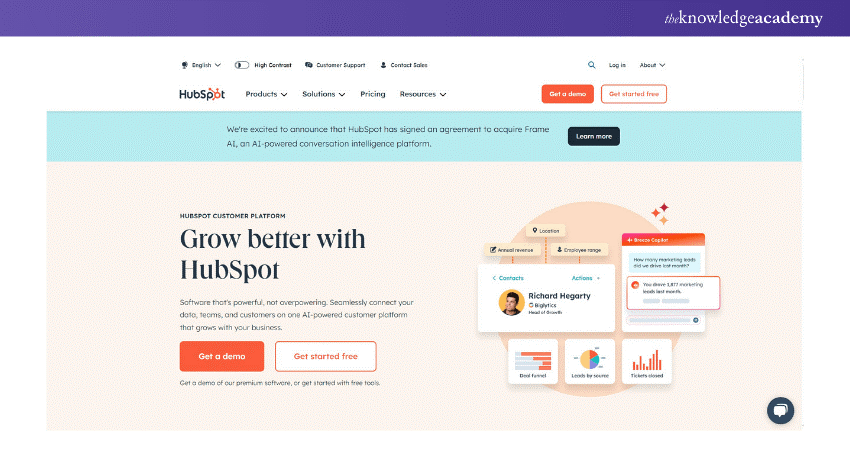
Allianz Care, a leader in health insurance and corporate healthcare, revamped its marketing by replacing static PDFs with analytics-driven interactive documents. This shift allowed the team to measure content performance in real-time, refine messaging, and optimise design, leading to improved engagement and wider reach.
Their "Understanding Food Labels" report exemplifies how data-informed content addresses client needs, strengthens industry authority, and drives lead generation. Allianz Care demonstrates how insights from data empower B2B organisations to deliver impactful, results-driven marketing.
3) GiveSmart
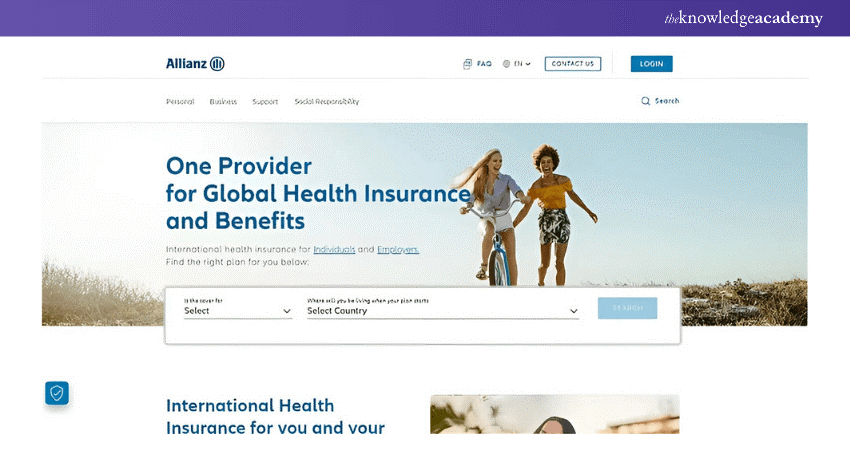
GiveSmart, a B2B SaaS provider for nonprofits and schools, overcame engagement challenges by adopting an analytics platform. With detailed insights into reader behaviour, they identified high-performing content and adjusted less effective materials. This data-driven approach boosted engagement and significantly improved lead generation.
An interactive whitepaper tailored to their audience's needs exemplifies their success. By using data to refine content and strategy, they highlight how informed decisions lead to measurable results in B2B marketing.
Unlock the secrets to Ecommerce success with our Ecommerce Strategy Course and elevate your digital business strategy today!
Benefits and Challenges of Data-Driven Marketing
Here are the key benefits and challenges of adopting a data-driven approach in B2B marketing.
Benefits of Data-Driven Marketing
The following are key benefits of data-driven marketing that make it an essential strategy for business success:
1) Enhanced Customer Understanding:
Data provides a crystal-clear window into customer behaviour. By analysing detailed insights, B2B marketers can truly understand what clients want, need, and expect.
2) Precision Targeting:
With data, businesses can create laser-focused marketing campaigns. This means more personalised interactions that actually resonate with customers.
3) Smarter Budget Spending:
Data-Driven strategies help businesses invest marketing dollars more wisely. You'll focus resources on approaches that deliver the best results, maximising return on investment.
4) Informed Product Development:
Data insights guide product creation. By understanding market needs, companies can develop offerings that customers actually want.
5) Competitive Edge:
Organisations using data effectively can quickly adapt to market changes, staying one step ahead of competitors.
Challenges of Data-Driven Marketing
The following are key challenges of data-driven marketing that businesses must address to implement it effectively:
1) Data Quality Hurdles:
Managing large volume of data from several sources is tough. Ensuring accuracy and reliability requires sophisticated approaches.
2) Privacy and Security:
Strict regulations like GDPR mean businesses must carefully handle customer data, balancing insight generation with legal compliance.
3) Complex Data Integration:
Combining information from different sources and extracting meaningful insights is technically challenging.
4) Resource Requirements:
Implementing a robust data strategy demands:
a) Advanced technological tools
b) Significant financial investment
c) Highly skilled personnel
5) Technological Evolution:
Data analysis technologies change rapidly. Staying current requires continuous learning and adaptation.
Unlock the secrets to performance marketing success and elevate your strategies with our Performance Marketing Training – join now!
Conclusion
B2B Data-Driven Marketing empowers businesses to make smarter decisions, deliver personalised campaigns, and achieve measurable results. By harnessing the power of data, companies can maintain a competitive edge in a market while meeting their clients' evolving needs. It's time to turn insights into action and drive meaningful success.
Transform your career with cutting-edge Digital Marketing Courses that provide practical skills and real-world expertise!
Frequently Asked Questions
How Can B2B Companies Use Data to Enhance Customer Data?

B2B companies can improve customer data by leveraging analytics to track behaviour, preferences, and interactions, allowing for more personalised strategies and enhanced customer experiences.
What are the 4 C's of B2B Marketing?

The 4 C's of B2B marketing are Customer, Cost, Convenience, and Communication. These elements focus on meeting customer needs, providing value, ensuring ease of access, and fostering clear, consistent communication.
What are the Other Resources and Offers Provided by The Knowledge Academy?

The Knowledge Academy takes global learning to new heights, offering over 30,000 online courses across 490+ locations in 220 countries. This expansive reach ensures accessibility and convenience for learners worldwide.
Alongside our diverse Online Course Catalogue, encompassing 19 major categories, we go the extra mile by providing a plethora of free educational Online Resources like News updates, Blogs, videos, webinars, and interview questions. Tailoring learning experiences further, professionals can maximise value with customisable Course Bundles of TKA.
What is The Knowledge Pass, and How Does it Work?

The Knowledge Academy’s Knowledge Pass, a prepaid voucher, adds another layer of flexibility, allowing course bookings over a 12-month period. Join us on a journey where education knows no bounds.
What are the Related Courses and Blogs Provided by The Knowledge Academy?

The Knowledge Academy offers various Digital Marketing Courses, including Data-Driven Marketing Course, Certified Artificial Intelligence (AI) For Digital Marketing Training and Digital Marketing Course. These courses cater to different skill levels, providing comprehensive insights into B2B Ecommerce.
Our Digital Marketing Blogs cover a range of topics related to B2B Marketing, offering valuable resources, best practices, and industry insights. Whether you are a beginner or looking to advance your Digital Marketing skills, The Knowledge Academy's diverse courses and informative blogs have got you covered.
Upcoming Digital Marketing Resources Batches & Dates
Date
 Data-Driven Marketing Course
Data-Driven Marketing Course
Fri 4th Apr 2025
Fri 27th Jun 2025
Fri 29th Aug 2025
Fri 24th Oct 2025
Fri 5th Dec 2025






 Top Rated Course
Top Rated Course



 If you wish to make any changes to your course, please
If you wish to make any changes to your course, please


